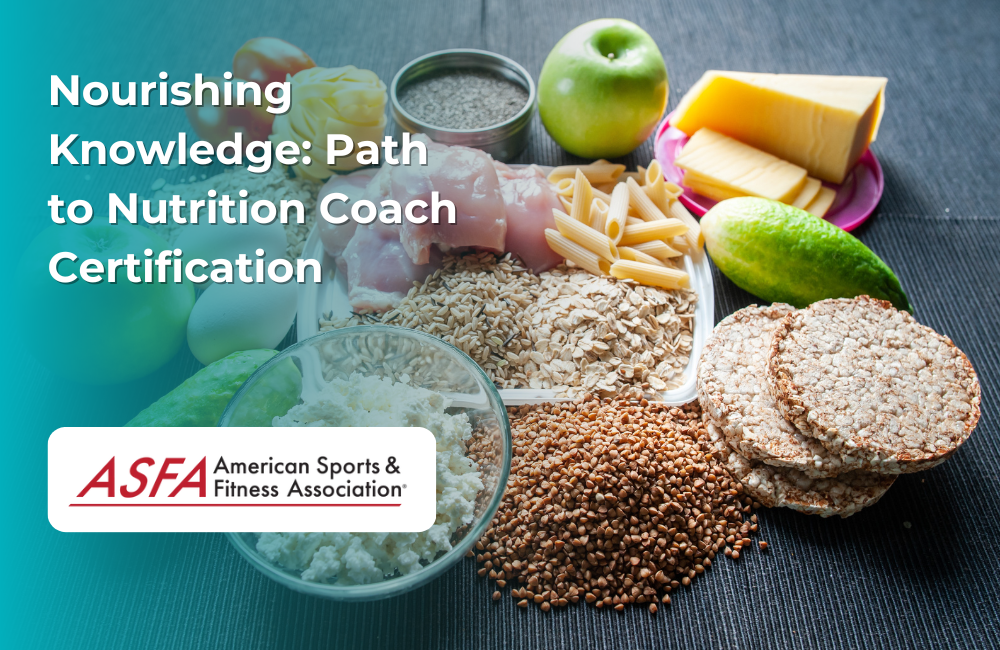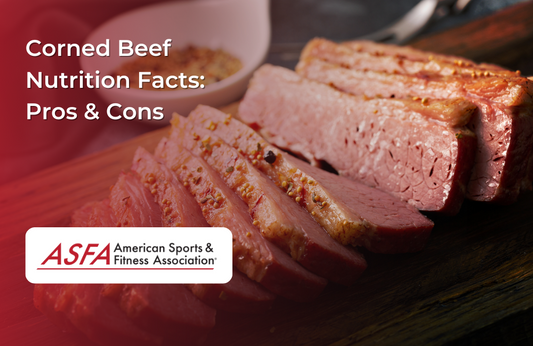In the diverse and ever-evolving world of health and wellness and the broader health and fitness industry, there exists a transformative and deeply impactful discipline known as Nutrition Coaching. This practice empowers individuals to take control of their health by making informed, conscious choices about their diet, well-being, and overall lifestyle. Nutrition education plays a crucial role in this process, providing individuals with the knowledge and skills needed to maintain healthy eating habits and overall wellbeing. As a nutrition coach, you will not only provide guidance on what to eat but also help individuals cultivate a healthy and sustainable relationship with food, enabling them to reach their wellness goals. For those aspiring to become certified nutrition coaches, this journey is an opportunity to turn passion into purpose, combining scientific knowledge with the art of coaching to effect positive change in the lives of others.
Nutrition Coaching is not just about meal plans, diets, or temporary fixes—it’s about understanding and addressing the holistic relationship between food, physical health, mental well-being, and lifestyle habits. It’s about providing the right education and support to empower individuals to nourish their bodies properly, enhance their vitality, and make lifelong healthy choices. For aspiring nutrition coaches, this path allows you to make a meaningful impact, helping clients navigate the often complex and overwhelming world of nutrition, guiding them toward personalized solutions that cater to their specific needs.
The Importance of Nutrition Coaching Certification
Earning a certification as a nutrition coach is more than just a credential—it’s a validation of your expertise, commitment, and readiness to guide others through their health journeys. Nutrition coaching certifications equip you with the essential knowledge of nutrition science, the psychology behind behavioral changes, and the practical coaching techniques needed to foster a positive and lasting impact. Through certification, you’ll learn to assess individual needs, provide tailored dietary advice, and help clients develop sustainable habits that improve not only their diet but their overall lifestyle.
At its heart, nutrition coaching encourages balance and mindfulness in eating. It emphasizes the importance of creating a healthy, positive, and sustainable approach to food, helping individuals make informed choices that promote long-term well-being. As a certified nutrition coach, you will work with clients to address their unique challenges, whether it’s weight management, performance nutrition, or specific health concerns like diabetes or heart disease. You will help them set realistic, achievable goals, and provide continuous support as they navigate the intricacies of their own wellness journey.
What is a Nutrition Coach?
Definition and Role
A nutrition coach is a professional who helps individuals achieve their health and wellness goals by providing personalized guidance on nutrition and lifestyle habits. Nutrition coaches work with clients to identify their unique needs and develop tailored plans to support their goals, whether it’s weight loss, improved overall health, or enhanced athletic performance. Unlike registered dietitians, who often focus on medical nutrition therapy, nutrition coaches take a more holistic approach, considering the client’s entire lifestyle and habits, not just their diet.
The Path to Becoming a Certified Nutrition Coach
Becoming a certified nutrition coach is a comprehensive process that blends theoretical knowledge with practical skills, ensuring fitness professionals are fully prepared to guide individuals on their path to better health. Below, we’ll outline the steps involved in becoming certified and the key areas you’ll explore as you work toward your certification.
Health and fitness professionals play a crucial role in the field of nutrition coaching, significantly contributing to their expertise and career development.
Part 1: Understanding the Nutrition Coach Certification
A nutrition coach certification formally recognizes your expertise in the fields of nutrition and dietary counseling through a comprehensive nutrition coaching program. It demonstrates your capability to assess individual nutritional needs, develop personalized meal plans, and provide effective coaching that promotes healthy, sustainable changes in clients’ eating habits. Certified nutrition coaches are trained to guide individuals through challenges like poor dietary habits, emotional eating, and confusion around food choices, helping them make informed and positive decisions about their health.
By becoming certified, you gain credibility as a professional, opening up opportunities to work in various settings such as wellness centers, gyms, private practice, or even in corporate wellness programs. Clients, employers, and peers recognize your knowledge and trust in your ability to deliver results based on scientific principles. This certification also emphasizes precision nutrition, an evidence-based approach that integrates personal data assessment, behavior change psychology, and a comprehensive understanding of nutrition science and coaching techniques to effectively support clients in achieving their health goals.
Part 2: Steps to Achieve Nutrition Coach Certification
To become a certified nutrition coach, you will need to follow a structured path, which typically involves education, hands-on experience, and assessment. Here’s an expanded look at the steps involved:
-
Research Certification Organizations: Your journey begins with selecting the right certification body. Reputable organizations like the American Sports & Fitness Association (ASFA) offer comprehensive programs recognized worldwide. These programs cover a broad spectrum of nutrition topics, from general nutrition principles to specialized fields like sports nutrition, weight management, and therapeutic nutrition.
-
Select a Certification Program: Once you’ve identified potential certification bodies, it’s essential to choose a program that aligns with your career aspirations. General certifications focus on the core principles of nutrition coaching, while specialized certifications allow you to dive deeper into areas like athletic performance, chronic disease management, or child and adolescent nutrition. Personal trainers can greatly benefit from these certifications to enhance their skills and better support their clients' nutritional needs. Consider your target audience and the kind of impact you want to make when choosing your program.
-
Enroll in a Certification Program: After selecting your program, it’s time to officially enroll. These programs are available in various formats, including online courses, in-person workshops, or hybrid models. Enroll in a format that suits your learning style and schedule. Certification programs typically cover essential topics such as macronutrients and micronutrients, the digestive system, meal planning, supplementation, dietary guidelines, and coaching techniques.
-
Study and Preparation: Dedicating time to study is crucial for success. During your program, you’ll explore fundamental nutrition concepts and advanced topics like nutritional biochemistry, food safety, and nutritional assessment methods. You’ll also learn how to conduct dietary assessments, analyze client food logs, and create personalized nutrition plans based on a client’s health goals, dietary preferences, and any specific medical conditions. Nutrition coaches help clients lose weight through sustainable habits and strategic changes, fostering a healthier relationship with food.
-
Gain Experience: Many certification programs require hands-on experience, which may involve internships or working alongside experienced nutrition coaches. This experience helps you apply theoretical knowledge in real-world scenarios, developing your ability to coach clients effectively. You’ll learn how to conduct initial client consultations, assess nutritional needs, and design customized, flexible meal plans. Real-world experience allows you to sharpen your communication and coaching skills, helping clients stay motivated and accountable to their goals.
-
Pass the Certification Exam: After completing your coursework and practical training, the next step is to take the certification exam. This exam will assess your understanding of nutrition science, dietary assessment, meal planning, and coaching strategies. Successfully passing this exam will officially certify you as a nutrition coach, enabling you to offer your services professionally.
-
Maintain Certification and Continuing Education: Certification is not a one-time achievement. To maintain your certification, you must fulfill continuing education requirements. This may include attending workshops, taking advanced courses, or earning credits by staying updated on the latest trends, research, and developments in the field of nutrition. By continually expanding your knowledge, you ensure that your coaching remains relevant and grounded in the latest scientific findings.
Part 3: Specializations and Advanced Certifications
Once you’ve obtained your general certification, you can further your career by pursuing advanced certifications in specialized areas of nutrition coaching, including becoming a health coach. Here are a few examples:
-
Sports Nutrition: Specialize in developing nutrition plans for athletes, focusing on optimizing performance, recovery, and body composition.
-
Weight Management: Become an expert in helping clients achieve sustainable weight loss or maintenance, using evidence-based approaches.
-
Medical Nutrition Therapy: Provide dietary guidance to individuals managing specific health conditions such as diabetes, hypertension, or autoimmune disorders.
Health coaches play a significant role in supporting overall health and wellness, addressing lifestyle factors such as stress management that impact both health and nutrition outcomes.
Specializing allows you to offer more targeted and effective coaching, positioning yourself as an expert in a niche area and attracting clients who require specific dietary advice.
Part 4: The Business of Nutrition Coaching
Nutrition coaching is not just about science; it's also about building a successful practice. Understanding the business aspects of nutrition coaching is essential for career longevity. This includes knowing how to set up your practice, navigate legal considerations like liability insurance and client waivers, and maintain high ethical standards when providing dietary guidance. Additionally, understanding marketing and client management will help you grow your business and build a loyal client base.
Part 5: Continuing Education and Staying Current in Nutrition Coaching Certification
The field of nutrition is dynamic, with constant advancements in research, new dietary trends, and evolving guidelines. Staying up-to-date with these changes is crucial for providing your clients with the most accurate and relevant advice. Continuing education through advanced courses, conferences, and workshops ensures that your knowledge remains fresh and applicable.
Part 6: Launching Your Career as a Nutrition Coach
After obtaining your certification, it's time to launch your career. Whether you choose to work in a fitness center, health spa, corporate wellness program, or start your private practice, there are many opportunities for certified nutrition coaches to make a difference. You'll be designing programs that range from weight loss management to athletic performance enhancement, helping clients set achievable health goals and providing them with the ongoing support they need to succeed.
Why People Need Nutrition Coaches
Personalized Nutrition Planning
In today’s fast-paced world, people often struggle to make healthy choices, leading to chronic diseases, weight gain, and decreased energy levels. Nutrition coaches fill this gap by providing personalized nutrition planning, helping clients navigate the complexities of modern nutrition and develop sustainable habits. With a nutrition coach, individuals can expect to receive tailored guidance on meal planning, portion control, and mindful eating, as well as support in overcoming emotional eating and developing a positive relationship with food.
Salary and Income Potential
Earning a Competitive Income
As a nutrition coach, one can expect to earn a competitive income depending on factors such as location, experience, and client load. Successful nutrition coaches can also earn additional income through workshops, online courses, and affiliate marketing. With the growing demand for health and wellness services, the career prospects for nutrition coaches are promising, making it an attractive career choice for those passionate about helping others achieve optimal health.
Embracing Your Role as a Certified Nutrition Coach
Becoming a certified nutrition coach allows you to make a significant and lasting impact on your clients’ lives. As a trusted expert in nutrition, you’ll guide individuals toward healthier choices, supporting them in reaching their wellness goals through sustainable dietary changes.
Health and fitness professionals, with certifications such as those offered by Precision Nutrition, significantly contribute to the expertise and career development in the field of nutrition coaching, enabling them to provide better service and support to clients interested in nutrition guidance.
The path to certification is not just about acquiring knowledge—it’s about developing the skills to inspire, motivate, and empower others to live their healthiest lives. As a certified nutrition coach, you’ll play a vital role in fostering positive change in the world, one client at a time. By following the steps outlined in this guide, you’ll be equipped to launch a rewarding career in nutrition coaching and contribute meaningfully to the health and well-being of your community.
The journey to certification is a transformative process, both for you and your future clients. Embrace the learning, the growth, and the opportunity to make a difference as you step into the fulfilling world of nutrition coaching.





